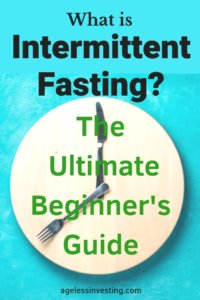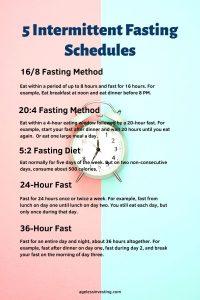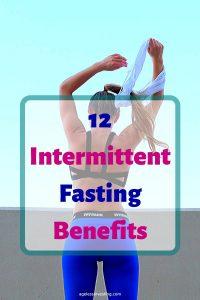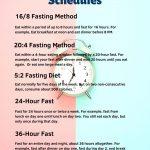Want to lose weight and get healthier without eating less or exercising?
The closest you will get is intermittent fasting.
Intermittent fasting involves eating in a short window and fasting the rest of the time.
In this article, you’ll learn the science behind intermittent fasting and why it works. You’ll also learn how to avoid intermittent fasting times, benefits, and mistakes.
I started intermittent fasting two years ago. I’ve experienced the benefits and learned from my mistakes.
The first week of intermittent fasting is tough, but the benefits are unparalleled. The good news is the weakness and hunger go away, and habits can be changed.
Keep reading to learn about the benefits, tips, and what to avoid.

What is Intermittent Fasting?
Intermittent fasting involves eating in a short window and fasting the rest of the time. You don’t have to restrict the kind of food or the amount you eat for the benefits.
Intermittent fasting is very popular in the health and fitness community. But it’s more than a fad.
Fasting has been practiced throughout history during times of famine. Food was not always available like it is now. With food available 24 hours a day, intermittent fasting is more important than ever.
There are many reasons for fasting, such as fasting for religious rituals.
In this article, we will focus on the health benefits of intermittent fasting.

Intermittent Fasting Times and Schedules
Here are the most common intermittent fasting methods. They offer similar benefits, but some are easier than others. Find the method that works for you.
The 16/8 Fasting Method
The 16/8 fasting method, also known as the Leangains method, involves skipping breakfast and eating within a period of up to 8 hours and fasting for 16 hours. For many, this is the easiest fasting method.
Start your fast after dinner and wait at least 12 hours before you eat breakfast the next day. Your body needs about four hours to digest; your liver needs about eight hours to cleanse (1).
Eventually, extend your daily fast up to 16 hours and eat within an 8-hour window. Also, give your body at least 3 hours between meals in your eating window.
For example, you’d eat between noon and 8 PM and fast from 8 PM until noon the next day.
The 20:4 Fasting Method
The 20:4 fasting method means eating within a 4-hour eating window followed by a 20-hour fast. Start your fast after dinner and wait 20 hours until you eat again. Then, eat within a 4-hour window, one or two meals with 3 hours in between.
For example, you could eat one or two meals between 2 PM and 6 PM and then fast until 2 PM the next day.
For the best results, wait at least three hours between meals. Or eat one large meal a day.
The 5:2 Fasting Diet
The 5:2 Fasting method involves eating normally for five days of the week and consuming about 500 calories on two non-consecutive days.
The 24-Hour Fast
With the 24-hour fast or the eat-stop-eat fasting method, you fast for 24 hours once or twice a week. This method involves fasting from lunch on day one until lunch on day two. You still eat every day, but only once during that day.
The best way to do this is to fast after dinner and not eat until the next day.
The 36-Hour Fast
The 36-hour fast involves fasting for an entire day and night, about 36 hours. For example, fast after dinner on day one, during day 2, and break your fast on day 3.
What Are The Risks of Extended Fasting?
Dr. Jason Fung recommends a general multivitamin for fasts longer than 48 hours. He also discourages anyone from fasting longer than 14 days due to the risk of re-feeding syndrome, which is the potentially fatal changes in fluids and electrolytes that may occur when feeding malnourished people (2).
The Most Popular Fasting Method
The 16/8 Fasting Method is the most popular because of its habit-building potential. Your body becomes used to it, and you don’t have to think about it.
In my opinion, the 5:2 Diet is the least beneficial—the benefits of a fast come from giving your body a chance to cleanse, not restricting calories.
Several different fasting plans share the same benefits. Choose a fasting method that works for you. And remember that it gets easier the longer you stay with it.

Intermittent Fasting Benefits
When you start a fast, your body undergoes many beneficial biological processes. This is when your body heals, cleanses, and repairs itself.
1. Initiates Autophagy
When you eat, your body goes into an anabolic state, storing nutrients and toxins. Eating is vital for building cells and storing nutrients in times of scarcity. The hormone insulin activates anabolism.
When you fast for over 6 hours, your body releases human growth hormone (HGH), which activates catabolism or autophagy.
Autophagy is a Greek word, auto meaning “self” and phagy meaning “to eat.” It means to eat oneself. When your body determines that there is insufficient food, it searches your cells for anything you don’t need.
Your body recycles damaged or useless cells into fuel or building materials to renew them (3). When you fast, you eliminate useless or harmful junk, keeping your body young and healthy.
Learn more about the power of autophagy in this interesting video from Dr. Boz [Annette Bosworth, MD]
2. Boosts Human Growth Hormone
Human Growth Hormone (HG) is a small protein produced by the pituitary gland and released into the bloodstream (4). HGH is released in bursts as levels rise following exercise, trauma, and sleep.
Besides activating autophagy, HGH initiates changes in metabolism that promote fat burning, saving proteins, and building muscle (5, 6).
These proteins and amino acids are used to enhance brain and neuron processing. They also rebuild collagen, which improves the strength and function of bones, muscles, ligaments, and tendons.
Further, HGH supports the skin, reduces wrinkles, and heals cuts and burns faster (7, 8, 9, 10).
Researchers at the Intermountain Medical Center Heart Institute discovered that men who fasted for 24 hours had a 2,000% increase in blood levels of HGH (11). Women had a 1300% increase in HGH.
3. Reduces Insulin Resistance
Intermittent fasting may lower blood sugar, reduce insulin resistance, and prevent type 2 diabetes.
Insulin, a hormone produced by your pancreas, unlocks your cells. This lets the sugar from the food you eat enter your cells to be used as energy (13). Generally, those with type 2 diabetes have a combination of insulin resistance and high blood sugar.
Insulin Versus HGH
Insulin and HGH have opposite functions. HGH supports tissue repair, efficient energy usage, and anti-inflammatory, immune function (14). Insulin is focused on energy storage, cell division, and pro-inflammatory immune activity (15).
Insulin and HGH cannot function at the same time. Because insulin is dominant, HGH is inhibited when conditions demand insulin (16, 17). For example, when you eat carbohydrates, your body releases insulin. If you’re always in a fed state, your HGH levels remain low.
Insulin resistance and Fasting
Insulin resistance happens when your cells become unresponsive to insulin. Your cells don’t get unlocked to let enough sugar (glucose) enter your cells. As a result, blood sugar levels remain elevated, and your cells are starved of glucose.
Fortunately, intermittent fasting has been shown to lower insulin resistance and blood sugar levels (18).
Studies have shown that intermittent fasting can reduce fasting blood sugar levels by 3-6% and reduce fasting insulin levels by 20-31% (18).
Further, one study of diabetic rats found that intermittent fasting protects against kidney damage, a serious diabetes-related problem (19).
One study, however, found that a 22-day intermittent fasting schedule worsened women’s blood sugar levels (20).
4. Can Ease Inflammation
Oxidative stress comes from an unfavorable balance of free radicals and antioxidants. Free radicals are highly reactive and unstable molecules produced when oxygen loses an electron (21). Free radicals can damage (22) biologically vital molecules such as DNA, proteins, lipids, and carbohydrates.
Oxidative stress is (22) one of the major factors of aging and most chronic diseases, including:
- Cancer
- Cardiovascular disease
- Alzheimer’s Disease
- Diabetes
- Parkinson’s disease
- Macular degeneration
Several studies show that Intermittent fasting may help the body reduce oxidative damage and improve cell stress resistance (23, 24).
Other studies find intermittent fasting reduces inflammation (24, 25, 26). Inflammation is one of your body’s healing mechanisms, but chronic inflammation promotes chronic diseases and aging.
5. May Be Good For Your Heart
These biomarkers include visceral fat, body weight, cholesterol levels, insulin sensitivity, vascular function, blood pressure, and lipid levels (18, 28, 29).
Further Reading:
6. Promotes Weight Loss
The most popular reason for intermittent fasting is weight loss (30).
People lose weight with intermittent fasting by eating fewer meals and fewer calories. But you don’t need to cut your calories to get the benefits of intermittent fasting.
How does fasting help you lose weight?
Intermittent fasting promotes the right hormones for weight loss. It lowers insulin levels and promotes higher HGH and norepinephrine, which help convert body fat into energy.
Fasting increases your metabolic rate by 3.6-14%, which helps you burn more calories (31, 32).
You can eat the same amount of food and burn more calories. Or you can eat fewer calories and still have a higher metabolism. You may lose more weight by eating fewer calories, but it isn’t necessary.
How much weight can you lose with intermittent fasting?
A 2014 review of scientific studies found that intermittent fasting can cause weight loss of 3-8% throughout 3 to 24 weeks (32). For a person weighing 150 pounds, that’s about 4.5 to 12 pounds over 3 to 24 weeks. But the amount varies from person to person.
The same people in the review lost about 4-7% of their waist circumference. This means that they lost belly fat or visceral fat. Visceral fat stores around your abdominal organs. And it’s a major risk factor for serious diseases such as heart disease, cancer, and dementia (33).
Your body stores toxins, or what it doesn’t know what to do with, in your fat cells. If intermittent fasting allows your body to eliminate and recycle wastes more efficiently, then you could store less fat in the first place.
7. Promotes Healing and Immunity
Why do you feel nauseous when you have an infection? It’s your body’s natural mechanism of getting you to stop eating. Fasting allows your body to focus on healing and killing pathogens.
Intermittent fasting promotes healing and immunity (34, 35, 36).
Give your body time to heal by restricting your eating to a short window.
8. May Prevent Cancer
Cancer is a name given to over a hundred dreaded diseases. Cancer develops when old cells fail to die and form abnormal cells (37). These abnormal cells cause tissue damage. Autophagy, when your body recycles damaged cells, may help prevent cancer.
Multiple animal studies show promising evidence that intermittent fasting may help prevent cancer (38, 39, 40, 41). However, more studies need to be performed on humans.
Lastly, one study found that short fasting may reduce the side effects of cancer treatments (42).
9. Improves Brain Function
The same benefits of intermittent fasting, such as reducing inflammation, blood sugar, and insulin resistance, also promote brain health.
Studies have shown that interrupting neuronal autophagy increases the risk of neurodegenerative diseases (43). If the brain does not consistently reach a fasted state long enough to cleanse itself, it could increase the chances of developing a brain disorder or cause mental decline.
High levels of circulating insulin prevent neuronal autophagy. Thereby causing accelerated neurodegenerative states or faster brain aging (44).
The good news is that Intermittent fasting gives your brain a chance to cleanse itself. It can also grow new neurons and connections for optimal function (45). With less waste, your brain can heal, grow faster, and become more efficient.
Did you know your brain uses up to 50% of your energy?
Intermittent fasting raises levels of the hormone brain-derived neurotrophic factor (BDNF) (46, 47, 48). A deficiency of BDNF is a possible factor in depression and other brain problems (49).
Animal studies on intermittent fasting and brain function
- Studies of rats have found that intermittent fasting may promote the growth of new nerve cells, which should improve brain function (50, 51).
- Other animal studies have found that intermittent fasting protects against brain damage from strokes (52).
10. May Prevent Alzheimer’s Disease
Alzheimer’s disease is the most common form of dementia. It affects memory, thinking, and behavior (52). Symptoms develop gradually but worsen over time.
Eventually, it disrupts simple everyday tasks. Alzheimer’s disease has no known cure, making prevention vital.
Your brain has about 100 billion nerve cells. Every nerve cell is connected to other cells to form a communication network (53). Each group of nerve cells has a specific job, such as learning, thinking, and remembering.
Plaques and tangles are believed to cause nerve cell damage and death (53) primarily.
- Plaques are deposits of protein fragments that accumulate in the spaces between nerve cells.
- Tangles are twisted protein fibers that build up inside nerve cells.
Autophagy, which eliminates and recycles waste, may help eliminate the plaques and tangles that damage nerve cells.
BDNF and Nerve Cells
Brain-derived Neurotrophic Factor (BDNF) levels control the creation of new nerve cells, synapses, and communication networks within the brain. Further, higher levels of BDNF promote healthier nerve cells and stronger communication systems between nerve cells (54).
Low levels of BDNF are associated with Alzheimer’s, dementia, memory loss, and other brain functioning problems (55).
Intermittent fasting from 16-18 hours has significantly boosted BDNF levels (56).
Animal Studies on Intermittent Fasting and Alzheimer’s Disease
- One study of rats found intermittent fasting may delay Alzheimer’s disease or minimize its symptoms (57).
- Other animal studies show intermittent fasting may help prevent neurodegenerative diseases like Parkinson’s and Huntington’s (56, 58).
11. Promotes Longevity
Intermittent fasting may be one of the easiest ways to add more quality years to your life.
- Studies of rats have found that intermittent fasting increases lifespan, like caloric restriction (59, 60).
- In one study, rats that fasted every other day lived 83% longer than rats that regularly ate (61).
Although more studies need to be done on humans, intermittent fasting looks promising for increasing lifespan.
12. Improves Energy Efficiency
Exercise and food scarcity force your body to become more efficient. Your body needs “good” stress like fasting to adapt and survive your environment.
The problem is that technology makes avoiding exercise and food scarcity easier. Depending on where you live, food is never far away.
Interestingly, fasting may give your brain cells the same mild stress that exercise exerts on your muscle cells. This mild stress forces your cells to adapt and become more energy-efficient (62).
Who Should Not Fast and Why?
You should not practice intermittent fasting if you’re one of the following (63):
- Underweight – a further fat loss would not be beneficial
- Pregnant or nursing – you need extra nutrition for your child
- Children under 18 – children need extra nutrition for growth and development
Who Should Fast Under Supervision (63)
- If you’re taking prescription medication
- If you have type 1 or type 2 diabetes
- If you have “gout or high uric acid.”

Intermittent Fasting Mistakes to Avoid
These mistakes can negate the benefits of fasting or cause harm.
1. Not eating enough calories
Most importantly, eat the same amount of calories as you normally would. The symptoms of caloric restriction include (64) very low blood pressure, loss of libido, infertility, menstrual irregularities, bone loss, cold sensitivity, loss of strength, slow healing, depression, and irritability.
2. Not Eating Enough Nutrients
You should eat nutrient-rich foods in your short eating window to prevent deficiencies. Intermittent fasting alone is not enough to get all the benefits. Give your body what it needs to build a new and healthy body.
3. Fasting and Overeating
Don’t use your eating window to binge on junk food or foods low in nutrition. Think of the opportunity cost of everything you eat. Will it bring you closer to your health goals?
4. Not Drinking Enough Water
Water helps you clear out all the waste from the cleansing process of fasting. You should drink at least one ounce of water for every pound of body weight. You need even more water when you exercise or live in a dry environment.
5. Obsessing With Arbitrary Fasting Times
A consistent schedule makes intermittent fasting easier. But don’t worry about arbitrary fasting schedules. Sometimes, your body needs to refuel sooner or extend its cleansing process.
Eat when your body feels ready. If you’re not hungry, your body may need more time to digest and cleanse. But if you’re hungry sooner, you may be deficient.
Everyone is different. Find a plan that works for you. If a fasting plan is causing more problems, then try something else.
High-Intensity Interval Training and Fasting
Many people believe high-intensity Interval Training (HIIT) in a fast state is the perfect workout for weight loss. But this is an extreme method. It isn’t necessary to get the benefits of intermittent fasting.
HIIT is an effective workout, so I included it in this article. Do not exercise in a fasted state until your body has time to adapt to the change.
- High-intensity interval Training is a method where you give 100% effort in a quick, intense burst of exercise, followed by rest.
- HIIT is as simple as doing one exercise, like sprinting, as fast and safely as possible for 30 seconds, then resting for 90 seconds.
- Make sure to warm up first and start with one rep when starting.
- Rest for several days in between HIIT days. Build up slowly to a workout of several reps that only takes about 15 minutes.
- For the best results, don’t set an arbitrary time. Instead, push to your max.
- Rest and recover until you’re ready to give 100% again.
Learn more about how to do HIIT correctly and its benefits in this short video.
Intermittent Fasting Quotes
“He who eats until he is sick must fast until he is well.”∼English Proverb
“I assert that fasting is the most efficient means for correcting any disease.”
∼Adolph Mayer, M.D., Fast Cures – Wondercures
“If thou wouldst preserve a sound body, use fasting and walking; if a healthful soul, fasting and praying; walking exercises the body, praying exercises the soul, fasting cleanses both.”
∼Francis Quarles
“Periodic fasting can help clear up the mind and strengthen the body and the spirit.”
∼Ezra Taft Benson
“Fasting is the first principle of medicine; fast and see the strength of the spirit reveal itself.”
∼Rumi
“The light of the world will illuminate within you when you fast and purify yourself.”
∼Mahatma Gandhi
“Every fool can fast, but only the wise man knows how to break a fast.” ∼G.B. Shaw
“The observances of the church concerning feasts and fasts are tolerably well-kept, since the rich keep the feasts and the poor keep the fasts.”
∼Sydney Smith
“Fasting is the greatest remedy – the physician within.” ∼Philippus Paracelsus
“Fasting today makes the food good tomorrow.” ∼German Proverb
“A fast is better than a bad meal.”∼Irish Proverb
“The very act of eating can be exhausting; it takes a lot of energy to digest food. When the body is freed from that chore, it naturally feels lighter and much more vibrant.”
∼Allan Cott
“(W)hen the faculties are empty, then your whole being listens.” ∼Thomas Merton
“Fasting cures diseases, dries up bodily humors, puts demons to flight, gets rid of impure thoughts, makes the mind clearer and the heart purer, the body sanctified, and raises man to the throne of God.”
∼Athenaeus of Naucratis
“To lengthen thy life, lessen thy meals.” ∼Benjamin Franklin
“Fasting of the body is food for the soul.”∼John Chrysostom
Intermittent Fasting Books
The Scientific Approach to Intermittent Fasting by Dr. Michael Vanderschelden is an easy-to-understand fasting resource. He explains the science behind fasting, provides actionable steps for planning, and gives motivation.
One thing that stands out about this book is that Dr. Vanderschelden shares how to implement exercise and fasting together.
Markus Rothkranz’s Heal Yourself 101 is a step-by-step guide to overcoming almost any health problem. In it, you will learn about fasting and how your body can heal itself when you give your body and mind only what it needs to thrive.
I started doing these steps one by one, and within a few months, I had more energy, my mind was clearer, and I was pain-free!
Can you drink during intermittent fasting?
Generally, you can drink tea or coffee and remain fast if it has less than 50 calories. But if you want the best results, drink water during your fast.
How much weight can you lose in a month with intermittent fasting?
Studies show intermittent fasting can help people lose 3-8% of their body weight throughout 3 to 24 weeks. A month (about four weeks) would be closer to 3%, or 3 lbs for 100 lbs of body weight.
Is Intermittent Fasting Good For You?
Intermittent fasting is generally good for you and has many health benefits: it promotes weight loss, reduces insulin resistance, promotes heart health, prevents cancer, improves brain function, and increases longevity.
What Can I Eat During Intermittent Fasting?
Food is generally not allowed during the fasting window. To suppress hunger longer, increase your fasting window slowly and eat plenty of high-fiber and nutrient-dense foods during your eating window.
What Is Your “Why” For Fasting?
Intermittent fasting is one of the simplest and most effective ways to improve your health. In this article, we covered the benefits of fasting and different methods. Also, you learned about who should not fast and the fasting mistakes to avoid.
The benefits of intermittent fasting include the initiation of autophagy, diabetes prevention, fat loss, energy, heart health, cancer prevention, brain health and function, and increased longevity.
Intermittent fasting’s cancer-prevention benefits may be one of the greatest health discoveries. I won’t wait for all the benefits of fasting or other healthy practices to be proven before I make a positive change.
“He Who Has a Why to Live For Can Bear Almost Any How.” ∼ Friedrich Nietzsche
What is your “why” for fasting or making a positive change?
Sources Cited
- https://drjockers.com/fasting-improves-brain-function/
- https://www.dietdoctor.com/fasting-and-re-feeding-syndrome
- https://www.ncbi.nlm.nih.gov/pmc/articles/PMC3106288/
- https://www.health.harvard.edu/diseases-and-conditions/growth-hormone-athletic-performance-and-aging
- https://www.ncbi.nlm.nih.gov/pubmed/12425705
- https://www.ncbi.nlm.nih.gov/pubmed/2355952
- http://www.ncbi.nlm.nih.gov/pmc/articles/PMC329619/
- http://www.ncbi.nlm.nih.gov/pubmed/20534752
- http://www.ncbi.nlm.nih.gov/pubmed/23980167
- http://www.woundsresearch.com/article/influence-short-term-repeated-fasting-skin-wound-healing-female-mice
- http://www.ncbi.nlm.nih.gov/pubmed/17174641
- https://www.ncbi.nlm.nih.gov/pubmed/1548337
- https://www.joslin.org/info/what_is_insulin_resistance.html
- http://en.wikipedia.org/wiki/Growth_hormone
- http://en.wikipedia.org/wiki/Insulin
- http://www.ncbi.nlm.nih.gov/pubmed/10484056
- http://www.jbc.org/content/274/19/13434.abstract
- http://www.sciencedirect.com/science/article/pii/S193152441400200X
- https://www.ncbi.nlm.nih.gov/pubmed/17316625
- https://www.ncbi.nlm.nih.gov/pubmed/15833943
- https://www.ncbi.nlm.nih.gov/pmc/articles/PMC3901353/
- https://www.ncbi.nlm.nih.gov/pmc/articles/PMC3249911/
- http://www.sciencedirect.com/science/article/pii/S095528630400261X
- https://www.ncbi.nlm.nih.gov/pubmed/17291990/
- https://www.ncbi.nlm.nih.gov/pubmed/17374948
- https://www.ncbi.nlm.nih.gov/pubmed/23244540
- http://www.cdc.gov/nchs/fastats/leading-causes-of-death.htm
- https://www.ncbi.nlm.nih.gov/pubmed/19793855
- http://www.sciencedirect.com/science/article/pii/S0104423013000213
- https://www.ncbi.nlm.nih.gov/pubmed/25540982
- https://www.ncbi.nlm.nih.gov/pubmed/2405717
- https://www.ncbi.nlm.nih.gov/pubmed/10837292
- https://www.nytimes.com/2018/06/11/well/live/belly-fat-health-visceral-fat-waist-cancer.html
- http://www.ncbi.nlm.nih.gov/pubmed/25225594
- http://www.ncbi.nlm.nih.gov/pubmed/24434759
- http://www.ncbi.nlm.nih.gov/pubmed/20425196
- https://www.cancercenter.com/what-is-cancer/
- https://www.ncbi.nlm.nih.gov/pubmed/3245934
- https://www.ncbi.nlm.nih.gov/pubmed/22323820
- https://www.ncbi.nlm.nih.gov/pubmed/16126250
- https://www.ncbi.nlm.nih.gov/pubmed/11835290
- https://www.ncbi.nlm.nih.gov/pubmed/20157582/
- https://www.nature.com/articles/emm201213
- https://www.ncbi.nlm.nih.gov/pmc/articles/PMC2629092/
- https://www.ncbi.nlm.nih.gov/pubmed/20534972
- https://www.ncbi.nlm.nih.gov/pubmed/11220789
- https://www.ncbi.nlm.nih.gov/pubmed/16011467
- https://www.ncbi.nlm.nih.gov/pmc/articles/PMC151440/
- https://www.ncbi.nlm.nih.gov/pmc/articles/PMC3022308/
- https://www.ncbi.nlm.nih.gov/pubmed/11220789
- http://onlinelibrary.wiley.com/doi/10.1046/j.0022-3042.2001.00747.x/abstract
- https://www.ncbi.nlm.nih.gov/pmc/articles/PMC2844782/
- https://www.alz.org/alzheimers-dementia/what-is-alzheimers
- http://www.plosone.org/article/info%3Adoi%2F10.1371%2Fjournal.pone.0066069
- http://www.ncbi.nlm.nih.gov/pubmed/21898045
- https://www.ncbi.nlm.nih.gov/pmc/articles/PMC2622429/
- https://www.ncbi.nlm.nih.gov/pubmed/17306982
- https://www.ncbi.nlm.nih.gov/pubmed/10398297
- http://geronj.oxfordjournals.org/content/38/1/36.short
- http://www.sciencedirect.com/science/article/pii/S0047637400001093
- https://www.ncbi.nlm.nih.gov/pubmed/7117847
- http://www.ncbi.nlm.nih.gov/pubmed/25552960
- https://www.dietdoctor.com/intermittent-fasting#benefits
- https://www.ncbi.nlm.nih.gov/pubmed/16226298

I thoroughly enjoyed reading your article. Very informative. I hope to read more of your works!
Thank you, Shane! Please let me know if you have any questions or if there is a topic that you want me to cover in-depth.
Very helpful article! This really gave me a better understanding about intermittent fasting! Thanks a lot for posting!
Thank you, Fitoru!!! Come back again, plan to update soon.
I’m confused, can I do a 20/4 fast with the 5/2 and I don’t know how to do both at the same time. Also, are there any restrictions on what I can and cannot eat during this time?
Hi Peaches
A 20/4 fast involves fasting 20 hours straight every day. A 5:2 fast means you eat normally five days a week, but two days of the week you’d eat about 500 calories. It’s not a good idea to combine fasting methods. Please consult your medical provider to determine which plan is right for you.
You can eat normally on an intermittent fast, but nutrient-dense whole foods are best, such as fruits, vegetables, and legumes/seeds/nuts.